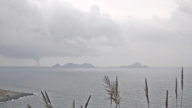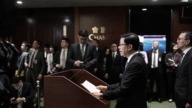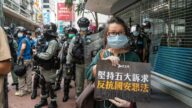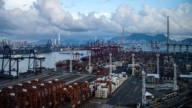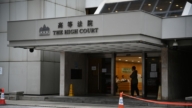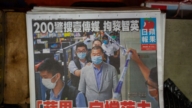【新唐人2014年05月27日訊】日前,2萬名澳門市民走上街頭,抗議政府專門制定保障高層官員福利的法令,及特首任內刑事豁免權。要求特區行政當局撤回關於「行政長官及主要官員的保障制度 」法案。據說這是89民運以後澳門最大規模的示威。有人認為政府的做法沒有道理,也有認為背後的原因不簡單。
5月25號下午,兩萬名澳門市民穿著白衣,手持標語和澳門特首崔世安及其他高官的人像,高喊「崔世安撤回惡法,反對自肥」、「高官貪上腦,特首離曬譜」的口號,走向澳門立法會。澳門警方表示,反對法案的遊行隊伍高峰時有7000人,但是,發起遊行的澳門民間團體「澳門良心」則表示,參加人數達到2萬人。據說這是89民運以後,澳門最大規模的示威。
據了解,澳門政府向立法會提交《候任、現任及離任行政長官及主要官員的保障制度》草案,建議立法設立特首及9名主要官員的福利制度,包括,特首離任後可取得相等於月薪70%的補貼。
若以現任特首崔世安為例,他曾擔任社會文化司長10年,可獲700多萬元的離任補償,離任特首時,另可領取每月約18萬9000元「長俸」。
而且,離任特首和主要官員,及其家屬保留享有醫療護理、藥物、外科手術及最高等級住院的權利。
民眾認為這是官員的「自肥」之舉。
大陸民主黨人士陳樹慶認為,澳門市民有權利遊行抗議官員自肥的行為。
大陸民主黨人士陳樹慶:「因為官員他本身不創造任何社會財富,他都是一個地方,或者一個國家老百姓納的稅養活他們,那麼給他多少工資的話,應該上是經過老百姓的同意,當然了這同意的程序會有議會表決,他們利用手中的權力制定一個規則,說自己可以多拿點錢,這個老百姓應該有權抗議。」
除工作條件和待遇的保障外,法案第四條還為特首提供司法保障。條文列明,除依照《基本法》程序予以彈劾並被中央免除職務者,「行政長官在任職期間內不適用刑事程序」。另外,特首在任期內可享有刑事豁免權。
香港《捍衛法輪功大聯盟》創始人熊立認為,澳門政府提出了這麼一條法案,背後的原因恐怕不簡單。
香港《捍衛法輪功大聯盟》創始人熊立:「可能背後有一定的政治的原因,我想是不是中共在背後做了一些動作,它擔心以後這個政局不受控制,澳門的一些官員都涉及到一些貪污,腐敗的問題,要查下去,可能會影響共產黨控制澳門政府的穩定性,那麼他們就出這麼一招,不會是無緣無故的。」
據澳門網路媒體《論盡媒體All AboutMacau》報導,面對2萬民眾的抗議,25號晚上10點30分,三名行政、立法兩會成員緊急召開了記者會表示,他們聯名向立法會主席遞信,要求全體會議議決「高官離補」法案,並且將法案送交一個委員會,以全體會議所指定的期限內,重新作細則性審議。
但是報導說,遊行的發起者,澳門民間團體「澳門良心」成員蘇嘉豪認為,行政及立法會成員的做法只是緩兵之計,他們和市民都不能接受。他指出,法案等於由一個黑箱交由另一黑箱審議,因為立法會只是一個「名存實亡」的監督機構。
蘇嘉豪表示,「澳門良心」組織堅決要求特首撤回法案。
熊立:「看來這是一個新的動向,他要確保一些高官不下臺,但是如果這些官員觸犯了法律,那麼你應該下臺的就應該下臺,必須按法律去辦。如果是用這樣的方法去保證他不下臺,要維持他的既得利益、維持他的權利,我認為這就是一種不好的做法。」
澳門立法委員會將在27號表決是否通過法案。
蘇嘉豪宣佈,如果澳門政府在27號立法會召開大會前,仍不撤回「離補」法案,將於27號下午兩點半起發起「包圍立法會」行動。
採訪/陳漢 編輯/田淨 後製/蕭宇
Macau: 20,000 People Protest Proposed Government Immunity Laws
20,000 Macau residents recently hit the streets in protest.
They are standing against government actions
enacting laws to protect the welfare of senior officials.
They are also protesting the criminal immunity
of the Chief Executive’s term of office.
They are calling for the SAR Administration to withdraw the
security system for the Chief Executive and principal officials.
It is said to be Macau’s largest demonstrations
after the 1989 pro-democracy movement.
Some people think the government’s approach does not
make sense, and the reasoning behind it is not simple.
On the afternoon of May 25, twenty thousand people
in Macau went to the Macau Legislative Assembly.
They were dressed in white, holding banners,
as well as pictures of Macau Chief Executive
Fernando Chui Sai On, and other senior officials.
The protestors were calling for
Chui Sai On to withdraw draconian laws.
They also protested against the self-enrichment,
and public corruption of senior officials.
Macau police said the parade opposing proposed
laws reached as maximum as 7,000 people.
Civil group ‘Macau Conscience’ reported that
the number of participants reached 20,000.
This is reported to be Macau’s largest demonstration
after the 1989 pro-democracy movement.
It was reported that the Macau government
submitted a draft proposal to the council security
system of the designate, incumbent and outgoing
Chief Executive, as well as principal officials.
It was proposed that the legislation set up a welfare system
for the Chief Executive and the nine principal officials.
This included that the Chief Executive may obtain subsidies
equal to 70% of a monthly salary, after leaving their position.
Taking Chief Executive Chui Sai On as an example, who
served as the social and cultural secretary for 10 years.
After leaving office, he will receive
compensation for more than 7 million yuan.
He’s also the outgoing Chief Executive, so can receive
a long-term monthly ‘pension’ of about 189,000 yuan.
Moreover, the outgoing Chief Executive,
principal officials and their families reserve
the right to care, drugs, medical and surgical
treatments in the highest level of hospitals.
Macau citizens believe that this
is the ‘self-enrichment’ of officials.
Mainland democrat Chen Shuqing believes that
Macau people have the right to protest this behavior.
Chen Shuqing, Mainland democrat: “Officials
themselves do not create any social wealth: it is
the national taxes of the people that feed them.
The salary should therefore be agreed by the people.
Of course, the Parliament will
vote on the consent procedures.
If they use their power to establish a rule that they
can earn more money, people have the right to protest."
In addition to safeguarding working conditions and
treatment, the fourth provision of the proposed laws
also provides judicial protection for the Chief Executive.
The provision stipulates that in addition to safety
from being removed from office by impeachment,
in accordance with ‘Basic Law’, ‘the Chief Executive
does not apply criminal proceedings during his tenure’.
The Chief Executive may also enjoy
immunity from prosecution during his term.
‘Hong Kong Falun Gong Concern Group’ founder
Xiong Li believes that the reason behind the Macau
government proposing such laws is not straight-forward.
Xiong Li: “There might be certain political reasons behind it.
I think it might be the Chinese Communist
Party (CCP) has undertaken some influence.
They worry that the political situation
is not under control, and some officials
in Macau are involved in corruption.
If this is investigated, it may affect the
stability of the CCP’s control over Macau.
This might well be the reason that they did this."
According to a report by web news site ‘All About Macau’
at 22:30 on May 25, three executive, legislative members of
the two organizations held an emergency press conference.
This was as they faced 20,000 people protesting.
They jointly handed a letter to the Chairman of the
Council, requiring a plenary meeting to resolve the
proposed subsidies laws for outgoing senior officials.
They asked for this to be handed in to a
committee for reconsideration during a
period appointed by all plenary sessions.
The news report suggests that the initiator
of the parade, Su Jiahao, a member of ‘Macau
Conscience’, believes that this is just a delay tactic.
The public do not accept it.
He pointed out that the proposed law is like the
consideration of a black box by another black box.
The Council is just an overseeing body ‘in name only’.
Su Jiahao further comments that ‘Macau Conscience’
insists on the withdrawing of the proposed law.
Xiong Li: “This seems to be a new trend. They want
to ensure some senior officials do not step down.
If these officials violate the law, then you
should step down according to the law.
If a law is implemented to ensure that he does
not step down, and maintains his vested interests
and rights, then I think this is a bad practice."
The Macau legislative committee will
vote on the proposed law on May 27.
Su Jiahao announced a plan if the Macau government
still does not withdraw the proposed law before the
legislative council convenes the meeting on May 27.
They will undertake surrounding the
Legislative Council on May 27 from 2:30 pm.
Interview/Chen Han Edit/Tian Jing Post-Production/Xiao Yu




